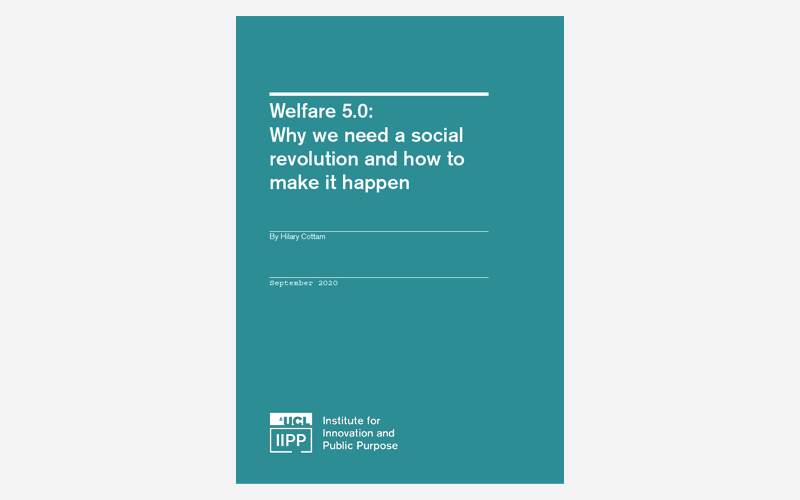Welfare 5.0: Why we need a social revolution and how to make it happen
A report by Dr. Hilary Cottam, Honorary Professor at the UCL Institute for Innovation and Public Purpose (IIPP), argues that investment is needed in the creation of a new social settlement.

7 September 2020
UCL Institute for Innovation and Public Purpose (IIPP) Policy Report, IIPP 2020-10
Authors
- Hilary Cottam | Honorary Professor, UCL Institute of Innovation and Public Purpose
Reference
Cottam, H. (2020). Welfare 5.0: Why we need a social revolution and how to make it happen. UCL Institute for Innovation and Public Purpose, Policy Report, (IIPP 2020-10). https://www.ucl.ac.uk/bartlett/public-purpose/wp2020-10
Foreword and acknowledgments by Hilary Cottam
The COVID-19 pandemic has amplified the conversation about the need to re-think capitalism and its supporting economic structures. Much less attention has been paid to the urgent need to re-invent our social systems.
In this paper, I argue that investment is needed in the creation of a new social settlement — one that can address the very different social, economic technological and ecological crises of today. Arguing that this is a moment of paradigm change, the paper sets out a new purpose, vision and social code that could inform a social revolution for our times.
This paper is work in progress. It was created through many conversations which I hope will continue and expand in the months to come. In particular, I would like to acknowledge the collaboration, support and ideas of Taufiq Bakiranze, Bob Filbin, Amy Jadesimi, Imandeep Kaur, Katie Kelly, Andy Knox, Margaret Levi, Tara McGuinness, Blair Miller, Gemma Mortensen, Martha Nussbaum, Carlota Perez, Roxanne Philson, Kate Raworth, Amartya Sen, Anne-Marie Slaughter, Allison Stanger and Shirley Southworth.
I am grateful to the Rockefeller Foundation for support in 2019 which enabled a group of us to come together and develop an earlier draft. I am honoured to be part of IIPP, and I would like to thank Rainer Kattel and Mariana Mazzucato for their insightful comments and their commitment to making this publication possible.
 Close
Close

